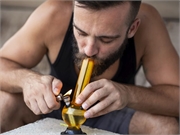Where Pot Is Legal, People Are Likely to Believe Its Benefits

TUESDAY, Dec. 17, 2019 (HealthDay News) -- If you live in a state where recreational marijuana is legal, you're more likely to think that it offers health benefits, a new study finds.
People think those benefits include relieving pain, anxiety and depression, researchers say.
"Our results show that residents of states where marijuana has been legalized for recreational use have an overall more favorable view towards potential benefits of marijuana use and were more likely to attribute benefits to marijuana use that are not supported by evidence," researcher Dr. Salomeh Keyhani and colleagues wrote recently in the Journal of Addiction Medicine.
Keyhani is a professor of medicine at the University of California, San Francisco.
These findings are worrisome because the cannabis industry is growing fast and aggressively marketing new products, the researchers said.
For the study, Keyhani's team asked roughly 9,000 adults about their beliefs and opinions of marijuana. The survey included people in states where pot is legal for recreational use; legal for medical use, or illegal.
Most respondents in states where pot is legal think it helps manage pain. That includes 73% in "recreationally legal" states; 67% in "medically legal" states; and 63% in states where pot remains illegal.
There's scant evidence, however, to support use of marijuana for pain relief, and none to show it can help treat anxiety or depression, the researchers said. In fact, they added, it may interfere with management of anxiety and depression.
Where recreational pot is legal, people are more likely to consider smoking it safer smoking than tobacco, but researchers said that, too, is not supported by evidence.
People in all states said marijuana can be addictive. In states where recreational use is legal, people also think it carries other risks, including memory loss and decreased intelligence and energy.
About 20% of respondents in recreationally legal states said they had used pot, compared with 15% in medically legal states and 12% in states where it's illegal.
Marijuana is legal for recreational or medical use in 33 states and the District of Columbia. Legalization has brought rapid increases in recreational use, as well as marijuana use disorders, Keyhani and her colleagues said.
"The favorable views of residents in recreationally legal states are cause for concern given the tide of commercialization, growing number of unstudied high-potency products, and the favorable media coverage promoting use," they concluded.
More information
Learn more about marijuana from the U.S. National Institute on Drug Abuse.

The news stories provided in Health News and our Health-E News Newsletter are a service of the nationally syndicated HealthDay® news and information company. Stories refer to national trends and breaking health news, and are not necessarily indicative of or always supported by our facility and providers. This information is provided for informational and educational purposes only, and is not intended to be a substitute for medical advice, diagnosis, or treatment.

